
Francesco "Ciccio" Ingrassia was an Italian actor, comedian and film director.
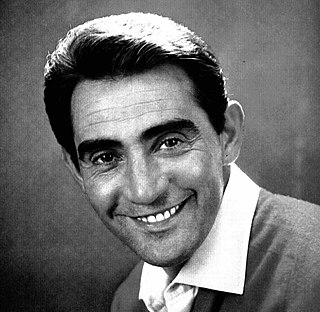
Walter Annicchiarico, known as Walter Chiari, was an Italian stage and screen actor, mostly in comedy roles.

Michele Abruzzo was an Italian actor.
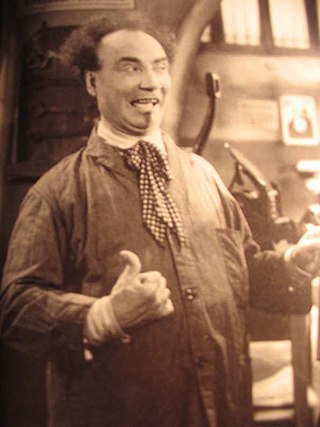
Angelo Musco was an Italian actor in theater and film. He was known for his comic abilities as well as for his carefully drawn psychological portraits.

A Lady Did It is a 1938 Italian "white-telephones" comedy film directed by Mario Mattoli and starring Michele Abruzzo, Rosina Anselmi and Alida Valli. It was shot at Cinecittà Studios in Rome. The film's sets were designed by the art director Alfredo Montori.

We Were Seven Widows is a 1939 Italian "white-telephones" comedy film directed by Mario Mattoli and starring Antonio Gandusio.
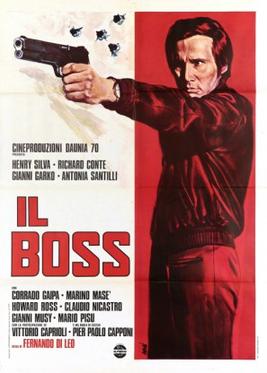
Il Boss is a poliziottesco-noir film written and directed by Fernando Di Leo in 1973. It is the final part of Di Leo's Milieu Trilogy, also consisting of Milano calibro 9 and La mala ordina, both released in 1972.

Mario Pisu was an Italian actor and voice actor.

Salvatore "Turi" Ferro was an Italian film, television and stage actor. He is considered the most important actor in the Sicilian theatre post-World War II era.
The Teatro Stabile di Catania is a theatrical institution based in Catania, Sicily, Italy which was formed in 1958. It has two theatres, the Teatro Giovanni Verga, the Teatro Angelo Musco. Annually, the program offers a choice of many shows, partly self-produced. It is the first permanent theatre in the South of Italy.

Mario Ferrari was an Italian film actor. After making his debut in 1920, Ferrari became a mainstay of Italian cinema during the Fascist era appearing in a mixture of leading and supporting roles. He played the villainous Graiano d'Asti in the historical film Ettore Fieramosca (1938). Ferrari continued to work regularly in the post-Second World War years.

The Ferocious Saladin is a 1937 Italian "white-telephones" comedy film directed by Mario Bonnard and starring Angelo Musco, Alida Valli and Lino Carenzio. The film was made at Cinecittà in Rome. On 28 April 1937, Benito Mussolini visited the newly completed studio. Along with the historical epic Scipio Africanus, this was one of the films he saw being made. The film, a vehicle for the Sicilian comedian Angelo Musco, is about an unsuccessful old comedian forced to find another work. While he is selling cakes in a theatre, the audience discover the highly sought-after collectible cards of "The Ferocious Saladin". Inspired by the event, the comedian sets up a successful comic piece on stage.
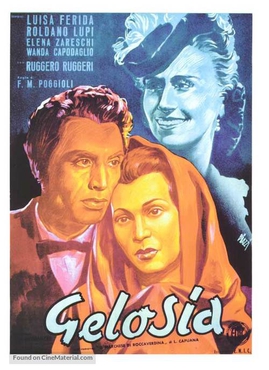
Jealousy is a 1942 Italian drama film directed by Ferdinando Maria Poggioli and starring Luisa Ferida, Roldano Lupi and Ruggero Ruggeri. The film was shot at the Cinecittà Studios in Rome with sets designed by the art director Gastone Simonetti. It belongs to the movies of the calligrafismo style. It is based on the 1901 novel Il Marchese di Roccaverdina by Luigi Capuana, which was later made into a 1953 film Jealousy.

Rosina Anselmi was an Italian stage, television and film actress. She was a prominent actress in the Sicilian language theater, especially in the province of Catania.
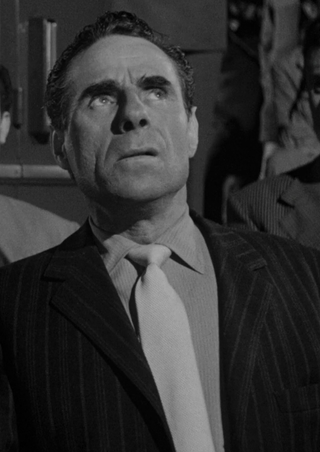
Rocco D'Assunta was an Italian actor, comedian and playwright.
The Matchmaker is a 1934 Italian comedy film directed by Amleto Palermi and starring Angelo Musco, Rosina Anselmi and Enrica Fantis.
Lasciate ogni speranza is a 1937 Italian comedy film directed by Gennaro Righelli and starring Antonio Gandusio, María Denis and Rosina Anselmi.
God's Will Be Done is a 1936 Italian comedy drama film directed by Amleto Palermi and starring Angelo Musco, María Denis and Sarah Ferrati.

The Amnesiac is a 1936 Italian comedy film directed by Gennaro Righelli and starring Angelo Musco, Checco Durante and Franco Coop. The film's plot is based on a stage play, inspired by the Bruneri-Canella case. It was shot at Cines Studios in Rome. The film's sets were designed by the art director Mario Rappini.

The Marquis of Ruvolito is a 1939 Italian "white-telephones" comedy film directed by Raffaello Matarazzo and starring Eduardo De Filippo, Peppino De Filippo and Leda Gloria. Based on a play of the same title by Nino Martoglio, it is set in Naples during the early 1900s. It is now considered a lost film.
















